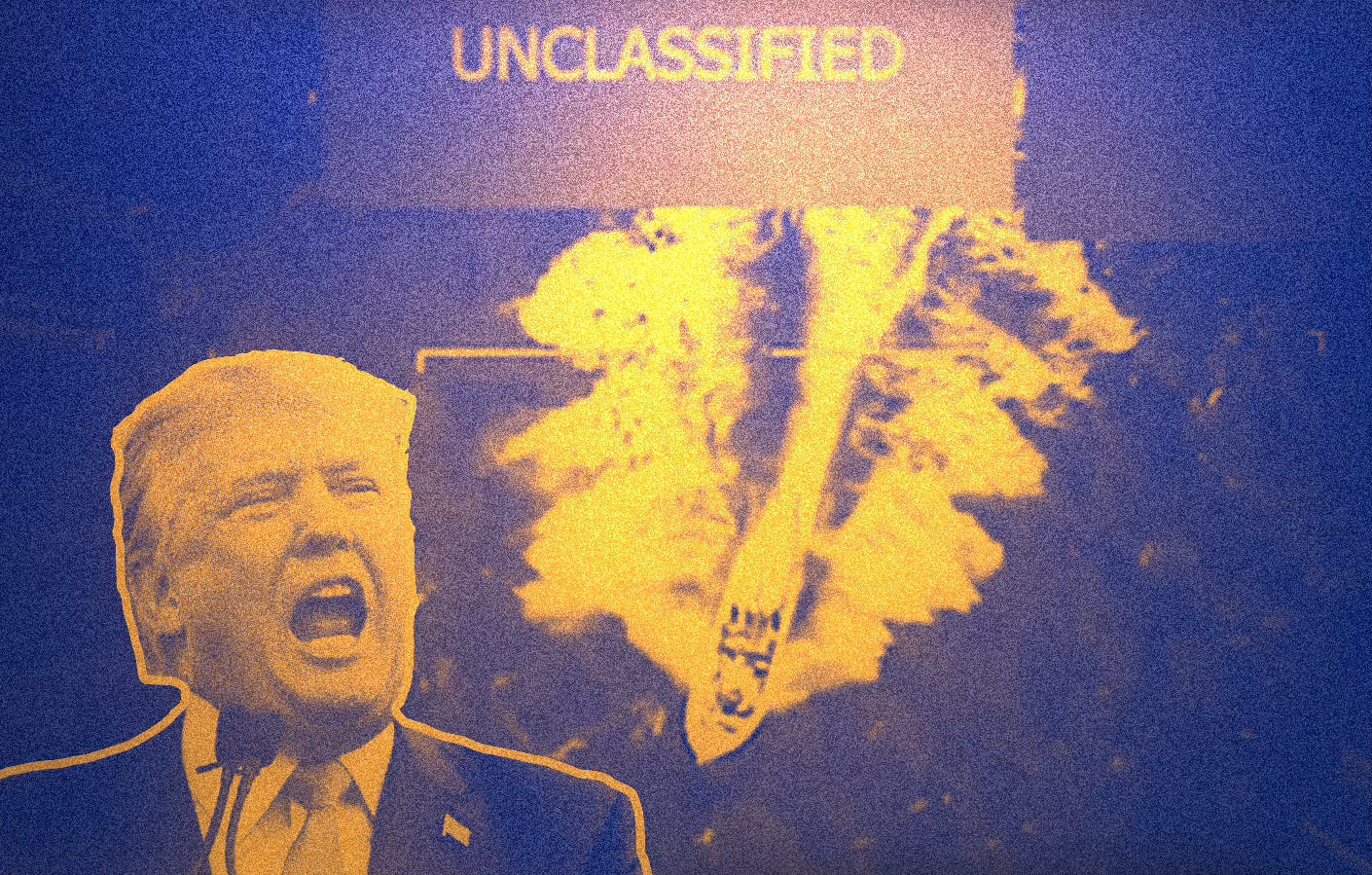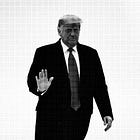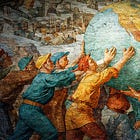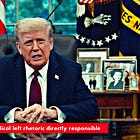Trump’s State Terrorism Against Venezuela Will Endanger American Lives
If the champion of the rules-based international order turns to violence as a first resort, so will other countries
A president hell-bent on shattering norms and terrifying the world may eventually run out of ways to evoke horror. But on Sept. 2, Donald Trump did something shocking even for him: ordering the cold-blooded murder of 11 people. With his active approval, they were summarily executed by an air strike on a boat carrying them off the coast of Venezuela.
Trump said that the vessel was manned by “Tren de Aragua Narco terrorists” from Venezuela carrying illegal drugs to the U.S. He also said, “We have tapes of them speaking” and that “we knew exactly who was in that boat” and “exactly what they were doing”—while offering nothing to document those easily verifiable claims.
Nothing about the administration’s story stands up to scrutiny. The Venezuelan criminal gang “is not known for having a big role in global drug trafficking but for its involvement in contract killings, extortions, and human smuggling,” ABC News noted. It would make no sense for drug smugglers to load up a small boat with so many people, taking up space that could be filled with drugs.
Trump posted a highly edited video on social media made up of “several clips of aerial surveillance,” as The New York Times reported, that “showed a speedboat cutting through the water, with a number of people onboard, before an explosion.” But unnamed administration officials told the Times that the video released by the White House:
does not tell the entire story. It does not show the boat turning after the people aboard were apparently spooked by an aircraft above them, nor does it show the military making repeated strikes on the vessel even after disabling it.
The Intercept added grisly details to the story, reporting that the people on board “were said to have survived an initial strike, according to two American officials familiar with the matter. They were then killed shortly after in a follow-up attack.”
The Venezuelan government disputed the administration’s claims. “We have done our investigations here in our country and there are the families of the disappeared people who want their relatives, and when we asked in the towns, none were from Tren de Aragua, none were drug traffickers,” said interior minister Diosdado Cabello. “How did they identify them as members of the Tren de Aragua? Did they have, I don’t know, a chip? Did they have a QR code and [the U.S. military] read it from above in the dark?”
Nothing coming from the Caracas regime can be taken on faith. But when the Trump administration offers no evidence to back up its accusations against the dead, it is even less credible.
The U.S. government does not have an immaculate record when it comes to correctly identifying enemies, as it has shown in slaughtering innocent civilians in Iraq and Afghanistan. Journalist Radley Balko also recalls the notorious 2001 episode when a CIA spotter in Peru mistook a Cessna carrying two Christian missionaries and their children as a drug plane—alerting the Peruvian air force, which shot it down.
The administration had no right under international—or, for that matter, domestic —law to obliterate the people on board merely because they allegedly belonged to what the president has designated a terrorist organization. Just the opposite.
The U.S. has every right to interdict illegal smugglers, arrest them, and prosecute them, as it has always done. That approach offers some protection for wrongfully targeted innocents. But as Brian Finucane, a national security lawyer at the International Crisis Group, pointed out, calling a gang a terrorist group does not confer “authority under U.S. law to use military force, nor does it magically transfer or transform that entity into a lawful military target.” To target and kill “another person outside an armed conflict, there’s a term for that, and that term is murder.”
Even though previous presidents have attacked overseas targets without congressional authorization and in violation of domestic law, a lethal attack on alleged drug traffickers without providing any proof first goes much further.
What is also different is the complete lack of remorse. As you would expect, the administration is not embarrassed to be seen carrying out an obvious atrocity. It’s swaggering with pride. Defense Secretary Pete Hegseth bragged that, “we smoked a drug boat, and there’s 11 Narco terrorists at the bottom of the ocean.” Responding to those who called the attack a war crime, Vice President JD Vance said, “I don’t give a shit what you call it.”
The strike fits perfectly with Trump’s campaign to assert unlimited power at home and abroad. It also serves to remind the world that the U.S. cannot be trusted to abide by the rules, norms, and policies it has helped establish and advance since World War II. George W. Bush often acted with unilateral recklessness as did Obama, but Trump has reached new lows. He is apparently determined to secure our undisputed place as the premier rogue nation on the planet.
His defenders may see his policies as a simple matter of looking out for No. 1, vigilantly safeguarding our interests despite the criticism we elicit. But actions like this are bound to seriously damage America’s image and influence around the world, to the lasting benefit of adversaries like Russia, China, and Iran.
Trump had already undertaken a massive effort to isolate us. He’s imposed huge tariffs on such allies as Japan, Germany, and the United Kingdom. He resorted to a 50% duty on goods from India, torching years of work to cultivate it as a counterweight to China. He refused to provide arms for Ukraine until other NATO members agreed to buy them from us and then ship them to Kyiv—turning a moral and strategic imperative into a grubby profit-making venture. He has antagonized the government and people of a previously friendly neighbor with whom we share a 5,500-mile border. In Trump’s view, writes Cullen Hendrix of the Peterson Institute for International Economics, “there are no friends, only potential adversaries you haven't crossed swords with (yet).”
Unlike the postwar framework of alliances and increasingly open trade, none of this is likely to make us safer, more influential, or more prosperous. Jacqueline Hazelton, a former professor at the Naval War College who now edits the journal International Security at Harvard, told me, “The problem with Trump’s attack on laws and norms is that it makes other countries more likely to see the United States as a threat.” Incidents like the “drug boat” strike, she warns, will “increase the possibility of attacks by malign non-state actors angered by U.S. behavior. It also means that other states are less willing and less likely to cooperate with the United States on important U.S. interests.” Some of the interests that come to mind: Catching drug smugglers and human traffickers, extraditing fugitives, curbing the influence of enemies, and protecting our troops abroad.
But Trump’s ostentatious belligerence puts Americans at risk in other ways. International law is a fragile framework that is often violated with impunity by the likes of Russia and Iran. But it gives governments at least a modest incentive to conduct themselves in a responsible manner and to resolve disputes without bloodshed. When the president exhibits contempt for such ideals, he gives other governments the message that raw military might is the sole currency in international relations. Venezuela may be in no position to challenge America militarily, but the same can’t be said of China. In a world where Beijing’s power is steadily growing, Trump’s brazen savagery erodes the barriers represented by international law. It’s likely to make Americans in international spaces more vulnerable to being blown up by hostile powers.
But Trump claiming the right to designate any people he chooses as terrorists and enemies—and then to kill them at will—is a grave threat to Americans for another reason as well: If he can use lethal force against a boat allegedly carrying illegal drugs and drug traffickers, it’s a small step to doing the same with cars and trucks entering the country from Mexico or Canada—or to unauthorized migrants crossing on foot. This is the same president who, in his first term, pushed for border agents to shoot these immigrants in the legs. “I have absolute power to shut down the border,” he said in 2019.
Nor should we assume that he would limit deadly tactics to the border. He has already deployed Marines to Los Angeles and National Guard troops to the District of Columbia, and he’s itching to expand his domestic military offensive. Press Secretary Karoline Leavitt said the quiet part out loud: “The president would love to do this in every Democrat-run city across the country.” Imagine how Trump might go after people suspected of being in the U.S. without documents—or people protesting ICE enforcement or any administration policy—if he were to invoke the Insurrection Act. Trump adviser Stephen Miller has said, “The Democrat Party is not a political party. It is a domestic extremist organization.” In the hours after Charlie Kirk was assassinated, Elon Musk declared, “The Left is the party of murder.” As it turns out, the assassin came from a Mormon background and is not, so far it seems, a standard lefty as the right had imagined.
Trump himself said the rhetoric of the “radical left” is “directly responsible for the terrorism that we’re seeing in our country today, and it must stop right now.” You don’t need much imagination to envision what brutal methods he might employ to suppress the radical left terrorism he depicts.
The president, meanwhile, continues to congratulate himself for an attack that will elicit fear among the innocent as well as the guilty. He was even amused by the possibility that the attack will intimidate anyone from venturing out to sea: “I don’t even know about fishermen. They may say: ‘I’m not getting on the boat. I’m not going to take a chance.’”
Trump said the strike was an act of national self-defense. But there’s a more accurate term for it: state terrorism.
© The UnPopulist, 2025
Follow us on Bluesky, Threads, YouTube, TikTok, Facebook, Instagram, and X.
We welcome your reactions and replies. Please adhere to our comments policy.









As a Venezuelan, I know a few people somewhat celebrating Trump striking down narco-terrorists. I find it so sad to see them believe in his promises when we've been let down again and again by this type of act. As our government pushes us even deeper into misery, people here seem to cling to the idea of foreign aid. But, if we know we can't believe a word that Maduro says, why would we believe Trump's?
ICC & Duterte. Will Trump tariff The Hague (via the Netherlands) for his bud, Duterte, like he did against Brazil for his bud, Bolsonaro?